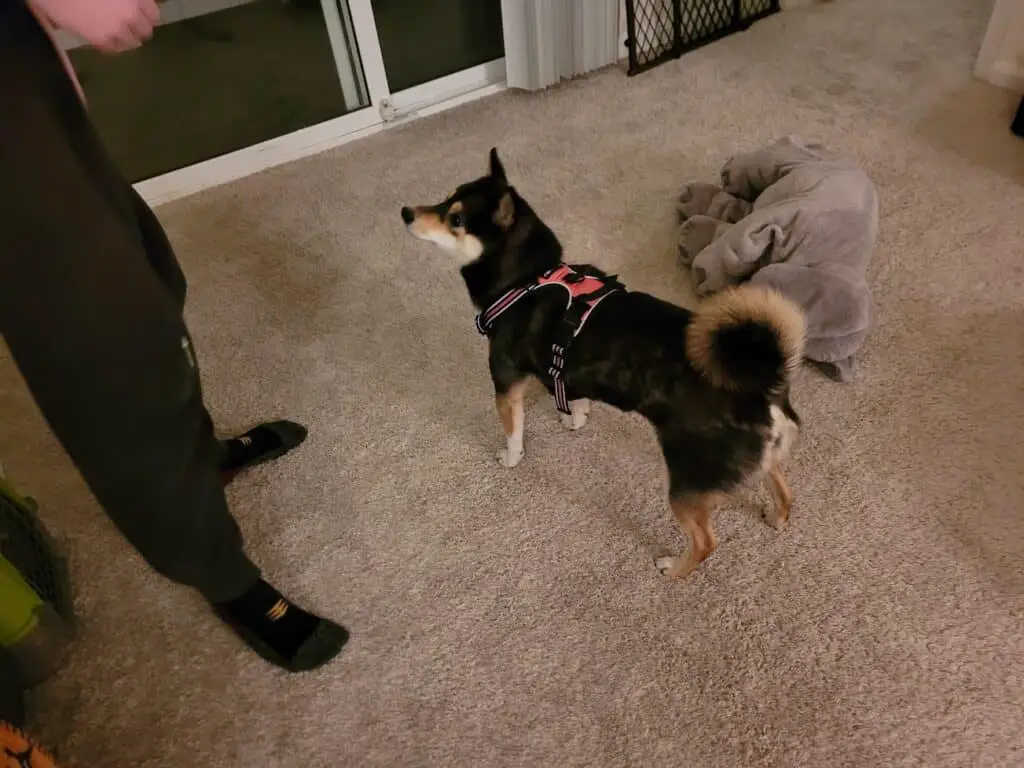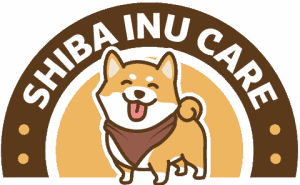This post contains affiliate links.
Choosing the right walking gear for your Shiba Inu is an important decision you’ll have to make as a pet owner. With options like collars and harnesses available, it can be a bit overwhelming to figure out which one is best for your furry friend.
That’s why we’re here to help you make a well-informed choice.

The Reason Harnesses Are Heavily Recommended For Shiba Inus
Harnesses provide better control over your Shiba Inu. This breed is known to be strong-willed and independent. A no-pull dog harness discourages pulling and helps you maintain control during walks. This way, directing your dog’s movements is easier, and you can both enjoy a peaceful stroll.
Another reason to choose a harness is comfort. Unlike collars, harnesses distribute pressure evenly across your Shiba Inu’s body. This avoids putting strain on their neck and prevents possible injuries, especially with the breed’s strong tendency to pull.
Safety is also a key factor in favor of harnesses. Shiba Inus are predisposed to glaucoma, a severe eye condition that could lead to blindness.
Collars can increase eye pressure due to the pulling and tugging, worsening the problem. Using a harness prevents additional pressure on the eyes, making it a safer choice for their health.
Crash Course On Dog Collars
The Advantages Of Using A Collar
Dog collars are the traditional choice when it comes to walking and controlling your Shiba Inu. They’re typically more durable, and they make it easy to attach a leash to the metal ring. Collars also provide a place to put your dog’s identification and contact information.
The Disadvantages Of Using A Collar
However, collars can cause issues for some dogs, especially Shiba Inus. When your dog pulls on the leash, it could lead to choking and discomfort. This is because collars put pressure on the dog’s neck, which might result in skin irritation and even injury in some cases.
What Kind Of Collar Is Best For Shiba Inus?
Shiba Inus are known for their intelligence and stubbornness, so finding the right collar that works for you and your dog is essential.
Standard Collars
Standard collars, such as nylon or leather collars, are the most common type. They’re durable and come in various styles and materials. However, keep in mind that Shiba Inus can be quite strong and may be able to slip out of standard collars.
You should carefully measure your dog’s neck and select the appropriate size.
Martingale Collars
Martingale collars are a great option for Shiba Inus because they provide more control without causing choking. These collars have two loops that tighten when your dog pulls on the leash, preventing them from slipping out. Still, monitoring your dog while using a martingale collar is essential to ensure that it doesn’t cause skin irritation or discomfort.
| Collar Type | Advantages | Disadvantages |
| Standard collars | Durable and easy to use. Ideal for attaching ID tags. | Can cause choking. Might not work for stubborn dogs. |
| Martingale collars | Safer and helps prevent your dog from slipping out. | Can cause skin irritation if not used carefully. |
Adverse Training Collars
Avoid using adverse training collars like prong collars or choke collars with your Shiba Inu, as they can cause injury and discomfort. It’s always better to rely on positive reinforcement and patience when training your dog.
Crash Course On Dog Harnesses
The Advantages Of Using A Harness
Using a harness for your Shiba Inu can offer various benefits. Since harnesses go around the chest instead of the neck, you have more control over your dog without putting pressure on their throat.
Harnesses can also help discourage pulling, which is especially useful for active and spirited Shiba Inus. Many harnesses are made of durable materials like nylon, ensuring they last for a long time.
The Disadvantages Of Using A Harness
While harnesses have many advantages, they aren’t without drawbacks. Some dogs may find a harness uncomfortable or limiting, especially if it’s not appropriately fitted. Adjustability is crucial, as a too-tight harness can cause chafing, while a loose one can allow your Shiba Inu to wiggle free.
What Kind Of Harness Is Best For Shiba Inus?
There are several types of harnesses to choose from, but two main types are typically seen with Shiba Inus: back attached harnesses and front attached harnesses.
Back Attached Harnesses
Back attached harnesses are the most common type. They’re lightweight, easy to put on, and offer good control for most dogs.
| Pros | Cons |
| Easy to put on | Less control over pulling |
| Lightweight | |
| Wide range of materials |
Front Attached Harnesses
Front attached harnesses, sometimes referred to as no-pull harnesses, are designed to give you more control over pulling behavior. The leash attachment is located on the chest of the dog, which discourages pulling by redirecting their movement.
| Pros | Cons |
| Better control over pulling | May be more difficult to put on |
| Discourages pulling | May be less comfortable on some dogs |
| Great for training |
What Size Harness Does A Shiba Inu Need?
When it comes to choosing a harness for your Shiba Inu, the size is crucial for comfort and safety. Consult the manufacturer’s sizing chart to select the appropriate dimensions for your dog. Generally, an adult Shiba Inu will need a medium harness, but to ensure the best fit, measure your dog’s girth (the widest part of their chest) and compare it to the sizing chart.
How To Pick The Right Harness For Your Shiba Inu
When choosing a harness for your Shiba Inu, comfort and control are essential. Look for a harness made of durable materials to withstand the energy of this active breed. Reading reviews from other Shiba Inu owners can help determine the best options available.
Pay attention to the harness’s buckle and adjustability. This ensures a secure fit, so your Shiba Inu is safe and comfortable, whether you’re hiking, biking, or just going for a walk. Easy-to-adjust straps and strong buckles will make all the difference when it comes to getting the perfect fit.
Safety features such as reflective strips or a handle for additional control can be beneficial, especially for energetic Shiba Inus still learning leash manners. Keep an eye out for harnesses specifically designed for hiking or biking with your dog, providing extra support and stability during these activities.
Remember, it may take a little trial and error to find the perfect harness for your Shiba Inu. Don’t be afraid to test a few options before deciding on the best choice for your furry friend. Happy walking!
Summary: How To Choose Between A Collar And Harness
When trying to decide between a collar and a harness for your Shiba Inu, it’s important to consider a few aspects. First, think about what activities you and your dog will be participating in, such as walking, running or training. Different situations might require a different setup.
With a collar, you have the advantage of simplicity and ease of use. Just attach the leash to the collar and you’re good to go. However, collars can sometimes put strain on your dog’s neck, especially if they tend to pull on the leash.
On the other hand, a harness distributes the force across your dog’s chest and back, reducing the strain on their neck. Harnesses can be especially helpful for Shiba Inus who are known to be independent and stubborn, and may pull during walks. Additionally, harnesses can be more secure for a Shiba Inu, as they are less likely to slip out of it compared to a collar.
When training your Shiba Inu, positive reinforcement is crucial. It’s essential to choose a setup that allows you to effectively communicate with your dog, without causing them discomfort. Both collars and harnesses can allow for this, but some harnesses might be more conducive to training due to better control.
Consider asking yourself the following questions when deciding between a collar and a harness:
- How does my Shiba Inu behave on the leash?
- What types of activities will we be participating in together?
- Will I be using this for training or general walking?
Weigh the pros and cons of both collars and harnesses for your specific situation and your Shiba Inu’s temperament.
Frequently Asked Questions
Are Dogs Calmer With A Harness?
Some dogs may feel calmer when wearing a harness instead of a collar. A harness distributes the pressure evenly across your dog’s chest and back, avoiding strain on their neck. This can make your Shiba Inu feel more secure and comfortable during walks.
Should Shiba Inus Wear Collars?
Shiba Inus should wear collars for identification purposes. A collar with a properly attached ID tag is important to ensure the safety of your dog. However, when it comes to walks and training, a harness might be a better option for comfort and control.
Can Shibas Be Trusted Off Leash?
Shiba Inus are known for their independent nature and high prey drive, which can make it challenging to trust them off-leash. Before letting your Shiba off-leash, make sure to train them well, and always be cautious in unsecured areas. It’s often better to keep your Shiba on-leash during walks to ensure their safety.
Is A Harness Or Collar Better For Training A Puppy?
A harness is usually better for training a Shiba Inu puppy. Harnesses offer better control and are less likely to cause injury during training. As your dog grows, you can transition to using both a collar for identification and a harness for control during walks and training sessions.
What Type Of Collar Works Best For Shiba Inus?
For most Shiba Inus, a flat, buckle collar is sufficient. Look for one that is made of durable materials like nylon or leather, and ensure it fits snugly but comfortably around your dog’s neck. Avoid using a choke or prong collar, as these can cause discomfort and may harm your Shiba Inu.
Which Harnesses Are Recommended For Shiba Inus?
When choosing a harness for your Shiba Inu, prioritize their comfort and your control. Features to look for include adjustable straps, padded chest plates, and secure buckles. Popular options include the Ruffwear Front Range Harness and the PetSafe Easy Walk Harness. Make sure to measure your dog accurately for a proper fit.

